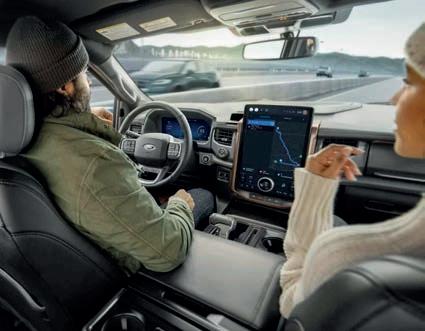
2 minute read
How much further can electric take us?
Group production manager Isabel Burton
Senior display sales executive Barnaby Goodman-Smith 2128
Advertisement
Event sales Tim George 0755 7677758
Classified and recruitment advertising rtmclassified@roadtransport.com
Sales director Emma Rowland 07780 604075
Divisional director Vic Bunby 2121
MT Awards Katy Moyle 2152
Managing director Andy Salter 2171
Editorial office Road Transport Media, First Floor, Chancery House, St Nicholas Way, Sutton, Surrey SM1 1JB 020 8912 2170
Free copies MT is available free to specified licensed operators under the publisher’s terms of control. For details, email mtsccqueries@roadtransport.com, or call 01772 426705
Subscriptions
RoadTransport@abacusemedia.zendesk.com 020 8955 7034
Motor Transport Subscriptions, Abacus, 107-111 Fleet Street, London EC4A 2AB
Denise Beedell Senior policy manager Logistics UK
Nationwide, the logistics industry is working tirelessly to achieve net zero emissions and work together with government to ensure our sector can meet the 2050 deadline. Logistics UK recognises that members and industry are concerned about how depot charging is enabled and funded, how the public electric vehicle (EV) chargepoint network can used by large vans and trucks, and what fiscal support can be provided to support decarbonisation. Logistics UK’s 2023 ‘EV report’ sets out operators’ experiences so far and looks to address the remaining challenges.
Vehicle operators are responding to the challenge of decarbonising their fleets and, although questions remain regarding the most appropriate methods for decarbonising larger vehicles, battery electric is proving a viable solution for vans and lighter commercial vehicles.
Research shows that at the end of 2022 there were over 42,000 plug-in vans on UK roads. Given that there are 4.63m vans registered and only a 0.6% increase in usage since 2019, the industry still has a long way to go.
One of the main challenges for logistics businesses looking to electrify their fleets is the uncertainty surrounding power supply infrastructure and how it will be implemented, as well as both the availability and accessibility of public chargepoints. While recent changes to the way local grid network reinforcements are paid for are encouraging, the reality for operators is that electrification is still going to result in substantial costs. Operators are already reporting costs between £100,000 and over £1m to transition their fleets and increase the power supply.
Forging closer relationships between commercial vehicle operators and energy suppliers will be vital for the successful electrification of fleets, as distribution network operators (DNOs) need to have a much greater understanding of where electric vehicle charging will be required and when. We are also urging government to provide transparency on available grid capacity and a common service agreement amongst DNOs for connections.
Logistics UK’s report shows that those who have operated EVs for some time have recognised that like-for-like replacement of existing diesels is not always possible and have adapted their operations to work within the capability of EVs. Logistics is an industry that thrives on its ability to adapt, with 59% of respondents that have already transitioned reporting a good response from their drivers to operating EVs. This is encouraging feedback, and with 58% of the respondents who have introduced EVs into their fleets having done so in the last two years, shows that there is an acceleration towards electric vehicles.
With sufficient support from government, and closer collaboration between government and industry, we could see an even larger uptake rate in the coming years.
Got something to say?
If you would like to contribute to MT’s Viewpoint, email steve.hobson@roadtransport.com
Rates UK £156/year. Cheques made payable to Motor Transport. Apply online at mtssubs.com
Registered at the Post Office as a newspaper
Published by DVV Media International Ltd © 2023 DVV Media International Ltd ISSN 0027-206 X









